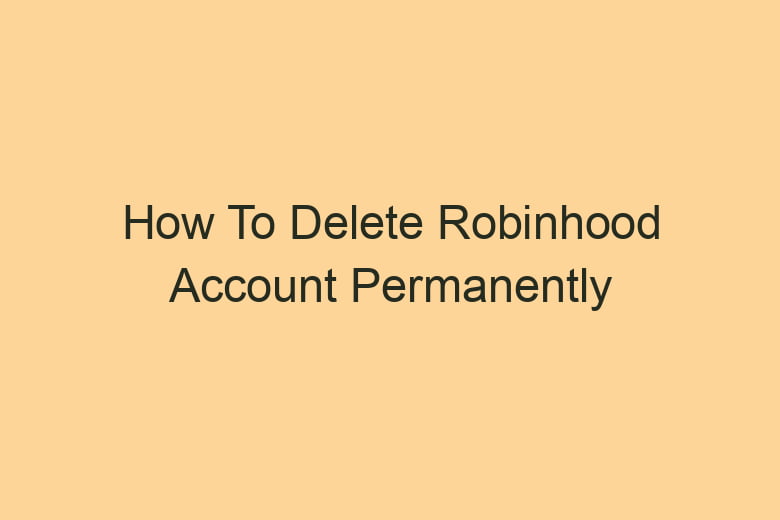When it comes to managing your investments and trading stocks, Robinhood has been a popular choice for many.
However, there may come a time when you decide that you no longer wish to use this platform, and you want to delete your Robinhood account permanently. But before you take this step, it’s crucial to understand the process, its implications, and what alternatives you might have.
In this comprehensive guide, we’ll walk you through the steps to delete your Robinhood account, provide insights into the reasons people choose to do so, and explore alternative investment platforms.
Why Delete Your Robinhood Account?
The need for account closure
There are various reasons why individuals choose to delete their Robinhood accounts. One common motive is the desire to consolidate their investments on a single platform for easier management. Others may find themselves dissatisfied with the services provided by Robinhood and seek alternatives that better align with their investment goals. Before you proceed, evaluate your personal reasons for account closure.
Privacy and security concerns
In an era of increasing digital threats, concerns about the security of personal financial information have become paramount. Deleting your Robinhood account can be a precautionary measure to safeguard your data from potential breaches or unauthorized access.
Dissatisfaction with the platform
Robinhood’s user experience and available features may not suit everyone’s preferences. If you’ve found the platform lacking in terms of research tools, investment options, or customer support, you might consider deleting your account in favor of a platform that better meets your needs.
Understanding the Consequences
Financial implications
Before you hit the delete button, it’s essential to consider the financial implications of account closure. If you have active investments, you’ll need to manage or transfer them to another brokerage. Additionally, you may incur taxes on any capital gains as a result of these transactions.
Tax considerations
Taxes can be a significant concern when closing your Robinhood account. Capital gains taxes may apply, and you’ll need to report these on your income tax return. Ensure you understand the tax obligations associated with your investments.
Access to transaction history
Deleting your account may limit your access to transaction history. Make sure to download or save any essential documents before proceeding. You may need these records for tax or investment purposes.
How To Delete Your Robinhood Account
Step 1: Review your investments
Begin by assessing your current investments on Robinhood. Decide whether you want to close all positions, liquidate assets, or transfer them to another brokerage.
Step 2: Clear your account balance
Ensure your account balance is at zero or as close to zero as possible. This involves selling any remaining investments and withdrawing the funds to your linked bank account.
Step 3: Contact Robinhood support
To initiate the account closure process, reach out to Robinhood’s customer support. You can do this via email or through the in-app support feature. Be prepared to provide necessary account details for verification.
Step 4: Account deactivation
Once Robinhood has confirmed your request, your account will be deactivated. This is a reversible state, and you can choose to reactivate your account within a specific timeframe.
Is There a Cooling-off Period?
Exploring the waiting period
Robinhood imposes a 60-day waiting period after account deactivation. During this time, you have the option to reactivate your account without losing your transaction history. Use this period to reconsider your decision.
Reconsideration options
If you’re still unsure about permanently deleting your account, Robinhood provides you with an opportunity to reverse the process during the cooling-off period. This feature allows you to maintain access to your account.
What Happens After Deletion?
Access to your data
After deletion, you will lose access to your Robinhood account, including your transaction history and account details. Ensure you have backed up any essential information before confirming the deletion.
Tax documentation
While your account is deleted, Robinhood retains tax documents for five years. You can request these documents if needed for tax reporting.
Alternative Investment Platforms
Platform features and fees
If you decide to move on from Robinhood, consider alternative investment platforms. Popular options include E*TRADE, Fidelity, and TD Ameritrade, each offering a unique set of features and fee structures. Research these platforms to find the one that best suits your needs.
Transfer options
When transferring your investments to a new platform, it’s essential to understand the process. Contact the receiving brokerage and follow their instructions for transferring assets. Ensure a smooth transition with minimal disruption to your investment strategy.
Frequently Asked Questions
Can I reopen a deleted Robinhood account?
No, once you have permanently deleted your Robinhood account, it cannot be reopened.
How long does it take to delete my account?
The account deletion process usually takes about one to two weeks from the time you contact Robinhood support.
Will my tax documents still be available after deletion?
Yes, Robinhood retains tax documents for five years, and you can request them if needed for tax reporting.
Are there any fees associated with account deletion?
Robinhood does not charge any fees for closing your account.
What are the most popular alternatives to Robinhood?
Some popular alternatives to Robinhood include E*TRADE, Fidelity, and TD Ameritrade, each offering a range of investment options and features.
Conclusion
Deleting your Robinhood account is a significant decision that requires careful consideration of your financial situation and investment goals. Be aware of the consequences, particularly the financial and tax implications, before proceeding.
If you decide to delete your account, follow the steps outlined in this guide and explore alternative investment platforms that align with your needs and preferences. Remember that your investment journey is a personal one, and the choices you make should reflect your long-term financial goals and strategies.

I’m Kevin Harkin, a technology expert and writer. With more than 20 years of tech industry experience, I founded several successful companies. With my expertise in the field, I am passionate about helping others make the most of technology to improve their lives.

